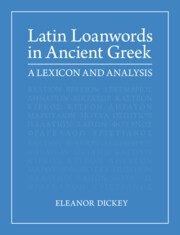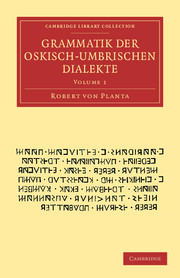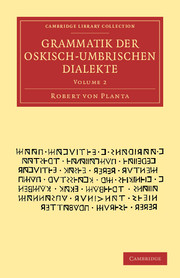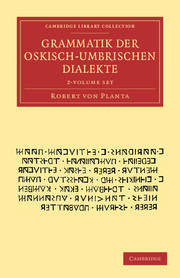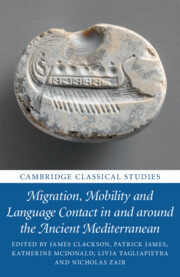Politeness in Ancient Greek and Latin
- Editors:
- Luis Unceta Gómez, Universidad Autónoma de Madrid
- Łukasz Berger, University of Adam Mickiewicz, Poland
- Date Published: December 2023
- availability: Not yet published - available from October 2024
- format: Paperback
- isbn: 9781009124164
Paperback
Other available formats:
Hardback, eBook
Looking for an inspection copy?
This title is not currently available for inspection. However, if you are interested in the title for your course we can consider offering an inspection copy. To register your interest please contact [email protected] providing details of the course you are teaching.
-
Politeness serves to manage social relations or is wielded as an instrument of power. Through good manners, people demonstrate their educational background and social rank. This is the first book to bring together the most recent scholarship on politeness and impoliteness in Ancient Greek and Latin, signalling both its universal and its culture-specific traits. Leading scholars analyse texts by canonical classical authors (including Plato, Cicero, Euripides, and Plautus), as well as non-literary sources, to provide glimpses into the courtesy and rudeness of Greek and Latin speakers. A wide range of interdisciplinary approaches is adopted, namely pragmatics, conversation analysis, and computational linguistics. With its extensive introduction, the volume introduces readers to one of the most dynamic fields of Linguistics, while demonstrating that it can serve as an innovative tool in philological readings of classical texts.
Read more- Provides a solid and accessible introduction to politeness research, using non-technical language to present the theories and methods in conjunction with explanations and examples
- Includes a glossary of key terms and intratextual references to provide greater explanation of the most important concepts
- Ensures that every chapter is self-explanatory in terms of concepts and methods
Reviews & endorsements
'… this impressive volume provides a wealth of information … It covers both literary and non-literary sources, goes beyond the usual textual suspects and provides ample contextualization.' Ezra la Roi, Bryn Mawr Classical Review
Customer reviews
Not yet reviewed
Be the first to review
Review was not posted due to profanity
×Product details
- Date Published: December 2023
- format: Paperback
- isbn: 9781009124164
- length: 424 pages
- dimensions: 229 x 152 x 22 mm
- weight: 0.613kg
- availability: Not yet published - available from October 2024
Table of Contents
Part I. Introduction:
1. Im/Politeness Research in Ancient Greek and Latin: Concepts, Methods, Data Luis Unceta Gómez and Łukasz Berger
Part II. The Expression of Im/Politeness:
2. Towards a Comparison of Greek and Roman Politeness Systems Peter Barrios-Lech
3. How to Be Polite without Saying 'Please' in Classical Greek? The Role of δή in Polite Requests Camille Denizot
4. Text as Interaction: ut mihi (quidem) uidetur as a Hedging Device in Latin Literary Texts Francesca Mencacci
5. Politeness Formulae in Roman Non-Literary Sources: The Case of Juridical Texts Rolando Ferri
Part III. Im/Politeness in Use:
6. Friendship Terms in Plato Michael Lloyd
7. Conversational Openings and Politeness in Menander. An Integrated Pragmatic Approach to Menandrean Dialogue Giada Sorrentino
8. Im/politeness of Interruptions in Roman Comedy Łukasz Berger
9. Im/Politeness and Conversation Analysis in Greek Tragedy: The Case of Theseus and the Herald in Euripides' Supplices Evert Van Emde Boas
10. Qui honoris causa nominatur. Form and Function of Third-Party Politeness in Cicero Lidewij Van Gils and Rodie Risselada
11. Banter, Teasing and Politeness in Varro's De re rustica Jon Hall
Part IV. Ancient Perceptions on Im/Politeness:
12. Being Polite the Roman Way. Comments about Im/Politeness in the Comedies of Plautus and Terence Luis Unceta Gómez
13. Impoliteness outside Literature: The Colloquium Harleianum Federica Iurescia
14. Politeness in Ancient Scholarship Anna Zago.
Sorry, this resource is locked
Please register or sign in to request access. If you are having problems accessing these resources please email [email protected]
Register Sign in» Proceed
You are now leaving the Cambridge University Press website. Your eBook purchase and download will be completed by our partner www.ebooks.com. Please see the permission section of the www.ebooks.com catalogue page for details of the print & copy limits on our eBooks.
Continue ×Are you sure you want to delete your account?
This cannot be undone.
Thank you for your feedback which will help us improve our service.
If you requested a response, we will make sure to get back to you shortly.
×

